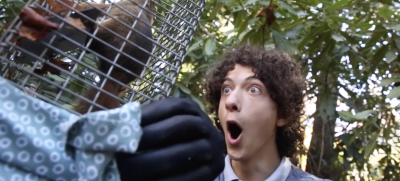Wild Things Make Their Hearts Sing
02/23/2023
The following excerpt is from an article by Renata Schmidt in Endeavors magazine.
In a small kitchen in western North Carolina, the smell of butter wafts through the air as Marie Young pulls shortbread from the oven. Several blankets drape across a worn couch and metal shelves line three of the walls, each packed with popcorn, peanut butter, tea, and ramen packets. The kitchen is the home base for 15 UNC-Chapel Hill students living at the Highlands Biological Station for the Fall 2022 semester.
Cole Prezant, Young’s research partner, enters the kitchen and the two briefly discuss the day’s events. The pair set traps earlier that morning and returned to them a few hours later to see which small mammals were captured. Prezant was a bit disgruntled to find two red squirrels enjoying the mixed nuts in two of the cages.
“There’s a really sharp learning curve when working with small mammals,” Young explains. “The bigger they are, the harder they are to handle, and squirrels are very strong.”
Over the semester, the pair have come to fawn over the shrews, mice, and chipmunks they catch. They’ve even named a few of the chipmunks — Floppy seems to be a station celebrity. Squirrels, though, make Prezant’s palms sweat as he slides on an extra-thick pair of gloves. They can bite and make data collection difficult.
Last semester, Young and Prezant surveyed these furry creatures to assess the health of the local forest. They completed their project at the UNC Institute for the Environment’s Highlands Field Site, a semester-long experience in Western North Carolina to help undergraduate students learn about the research process and guide their career goals.
To read more and to watch a video about this project, please visit Endeavors magazine.